I carve a tiny piece of wood off the base of the reed. The shaving isn’t much larger than one or two hairs of daily growth on a man’s face. Almost nothing. I put the reed back on the mouthpiece and fasten it with the ligature. I form an embouchure and play the scale I repeat hundreds of times a day to check reeds. The raspiness has gone from the reed’s vibrations. The difference is huge. Now it has a bell-like ring as it pings through the instrument. Ahh!
After 2 hours of working on reeds, I am tired. Add five hours of rehearsals today and that’s a full day. But I haven’t finished. I still need to review specific sections of this weekend’s music. And the reed I just fixed might not make it through five minutes of playing, with the time spent on it lost after that.
Why do I do this? I smile as I ask myself. “Because I love it†might be one answer. But that’s not quite it. It’s more like an itch I have to scratch. From age 12 on I had the “ring†of the clarinet’s tone in my head, an ideal to strive for. Such a goal is elusive; it shifts and hides moments after being within your grasp.
Reeds are part of the problem, but so is being human. I am not a machine. I have to eat and sleep. I get tired. I have good days and bad. Yet the goal is always there; to outdo myself. Like an athlete wishing to win the Olympics, I strive for perfection with an all too human body and life. I may not always achieve it. But the striving tenures me to strong and tenacious character.
Of course, playing the instrument alone is only part of this puzzle. I am a clarinetist because I love music. Why do I love classical music so much?
As I ponder this question, my ear wanders to a CD playing of Bach’s Goldberg Variations performed by Andras Schiff. It’s a new recording for me. I have at least four recordings of this piece by different performers. Each player creates something fresh with their interpretation. So while the music is very familiar to me, it sounds new in this pianist’s hands.
Bach’s variations are accessible, dancelike and intimate, humorous and poignant. One in particular, the 26th, breaks my heart each time I hear it. I hang on every note. Schiff’s version is surprisingly feminine and coquettish, but with amazing facility and control. The tone of the particular piano he plays is also exquisite.
This brilliant music, and the performance, seems to come from somewhere beyond human capabilities. Yet it reflects human emotions in a crystalline way. It says something to me which I cannot articulate. It tells me who I am and who I could be. It reminds me of my humanity and my frailty, my nobility and my baseness. It reaches across ages, like sculpture or painting, and shows me how history and art has formed me and the civilization I live in.
Classical music offers a place of sanity in a harsh world. It clears the haze of daily life and allows us a glimpse of the thoughts and feelings of great people and a connection to our higher selves. And of their vulnerabilities. Who wouldn’t want to be inside Einstein’s head, or Picasso’s or Martin Luther King’s, as they thought and felt their great deeds? Well, I do. My life’s commitment is to be the instrument which recreates the vision of great composers for others.
Unlike painting or literature, classical music is experienced directly in time. Though I enjoy recordings of great pianists and orchestras, I relish hearing one as it happens. A live performance reflects a unique snapshot in time, much like sports are reality in action. Just like the excitement of a supportive crowd in sports, the audience affects performers with their attention and enjoyment. In a live performance, the history of today day can cue a great performer to fresh new depths of expression and heights of emotion for those listeners.
Orchestral performances are an intersection of many parts. First you have the music itself and the history of its style, something like recreating Van Gogh’s Starry Night. Then you have the particular orchestra and conductor, the “repainters”, if you will. Each member of the orchestra brings their own ideals and experience to the table, which then has to amalgamate into one voice. Then there are the acoustics of the hall, and the audience’s interest. It comes together each time to form a unique experience. When it all gels and the energy builds towards perfection, a particular performance can become an epiphany for all concerned.
Back to my own life and career. I may fix numerous good reeds at home, but few withstand the test of playing in my hall. The acoustics are deplorable, sadly, for the orchestra and especially the audience. This is not a concert hall, but a movie theater. It is not meant for the sublte voice of great music. I need a dense, resonant tone to carry my musical intentions to the odd corners of the cavernous room and the ears of listeners. Dozens of hours of work are usually spent to find the right reed for the hall, one which responds in the weather of that day and the demands of that night’s music.
Recently, I have been experimenting with other aspects of tone production, especially mouthpieces. When I first got this job 18 years ago, I had a great combination of reed type and mouthpiece which fit perfectly with the hall. I thought it was all the practicing I had done before winning the audition. I was naive. When that mouthpiece warped, ruining it, I searched for a decade and never found one with such beauty of tone. In the process I became a better musician. But it wasn’t without its cost in tens of thousands of dollars and countless hours and stress. Somehow I wonder if it’s worth it. I warn students of the gravity of choosing a music career.
All this thought and activity is before I play a note in a concert. In a live performance, a musician is naked. No second takes. Even beyond practicing clarinet, I have worked a great deal behind the scenes to make it seem “effortless†on stage. I have studied various techniques for focus and presence in order to overcome fatigue and stress from so many hours of repetitive practicing.
In truth, much of my daily life since age 12 has been working toward the present performance. The goal may be ideal, but a human plays for it. Personally, I play better when I know I am being heard and appreciated. A great conductor helps bring my focus together, as does a great audience.
When the concert finally begins, the first note is a commitment to the rest of the piece and to my colleagues. Egos may clash on and off stage, but conflict usually disappears as the conductor raises his baton and we come together to go beyond ourselves. All my work may or may not pay off this time. Even the best athletes trip.
Is it worth it? All this for the love of great ideas!? I guess that tiny shaving of reed is worth a great deal to me.
 People often think of the Buddhist idea of detachment as something cold and distant. The truth is, detachment occurs naturally when you understand how it is inherent in consciousness. It’s like being shown how a car is driven. From the outside, it looks as if the car is driving itself. But once you know there’s a driver, then the car becomes the vehicle being driven by someone.
People often think of the Buddhist idea of detachment as something cold and distant. The truth is, detachment occurs naturally when you understand how it is inherent in consciousness. It’s like being shown how a car is driven. From the outside, it looks as if the car is driving itself. But once you know there’s a driver, then the car becomes the vehicle being driven by someone.
